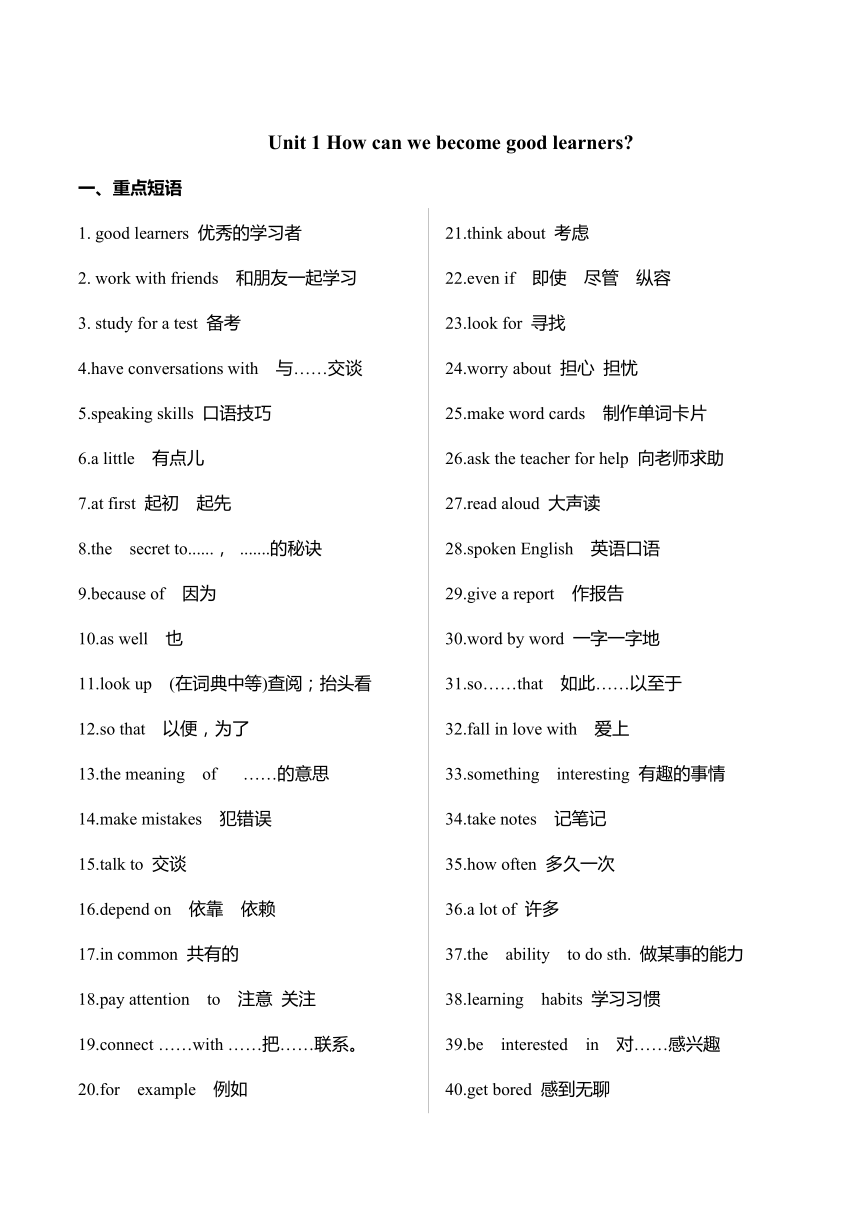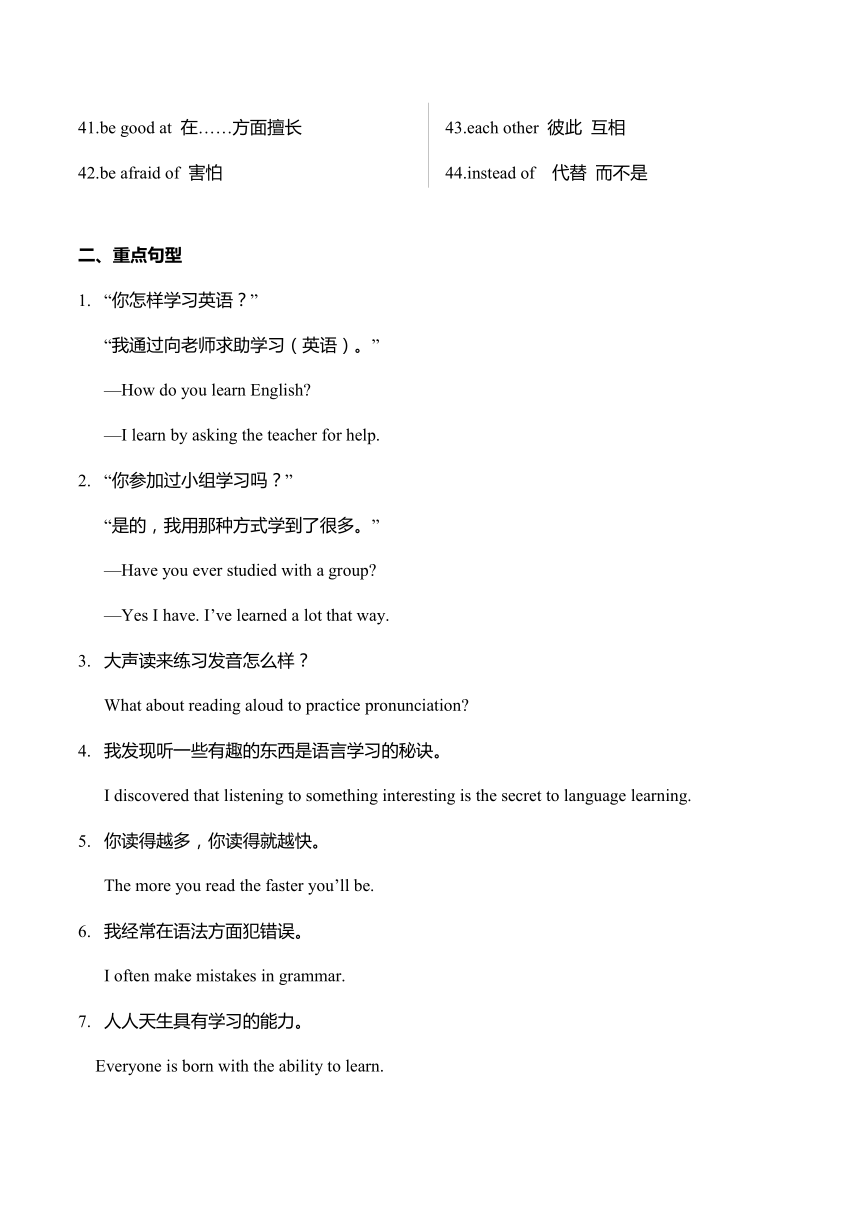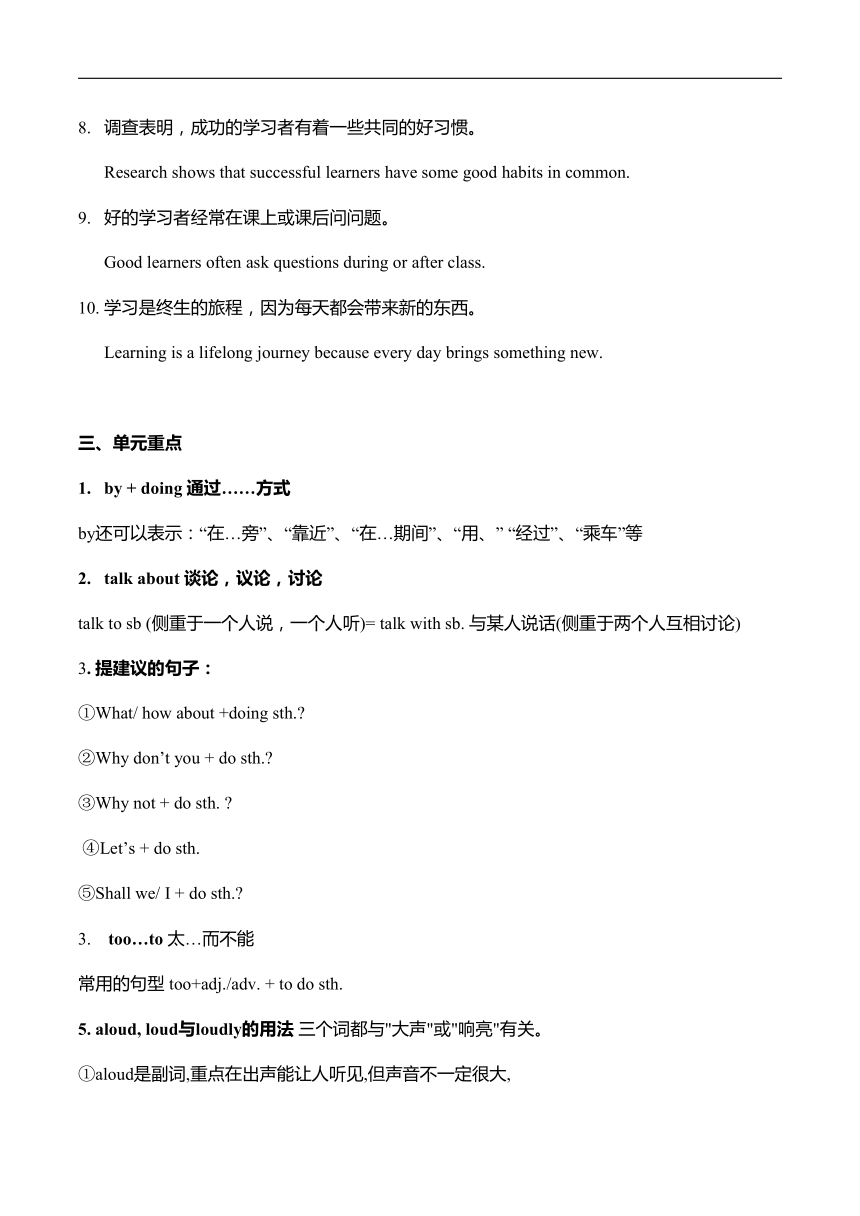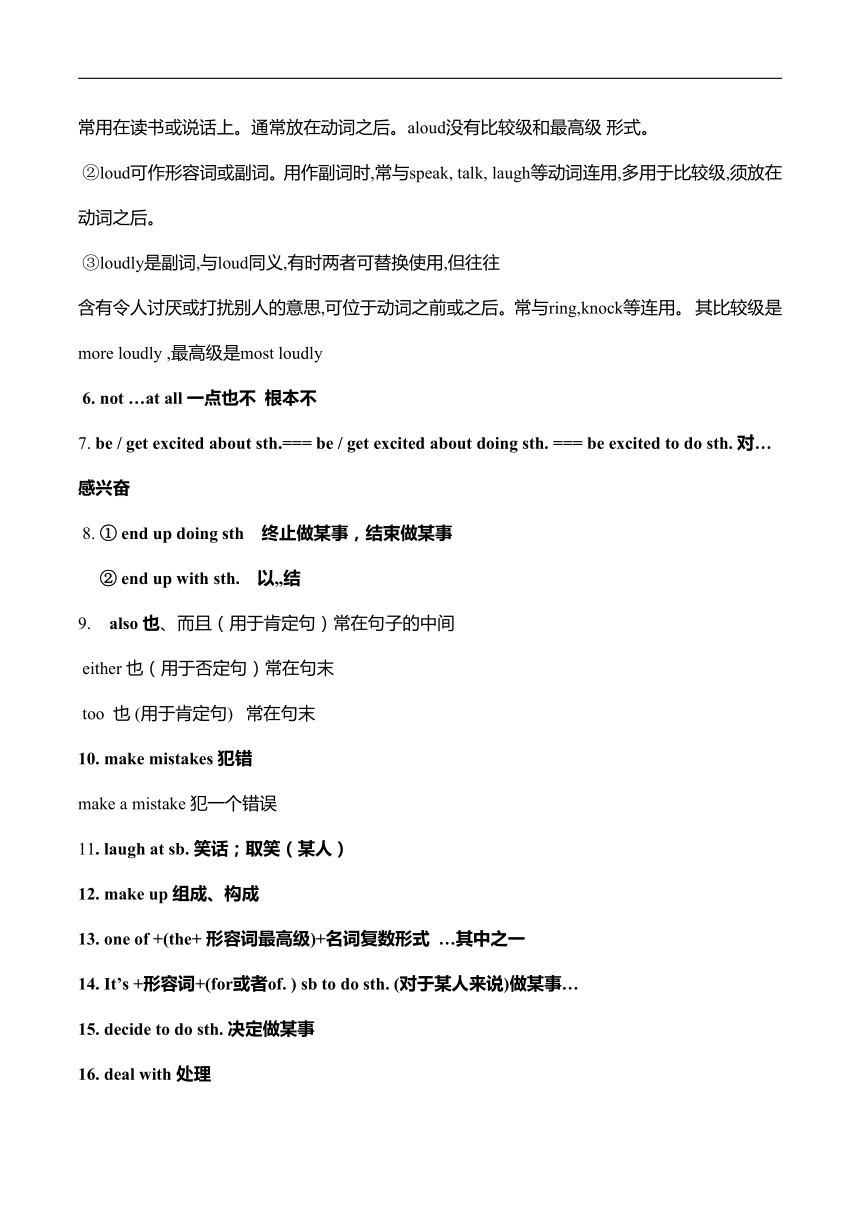Unit 1 How can we become good learners. 课文重点归纳练习2023-2024学年人教版英语九年级全册(无答案)
文档属性
| 名称 | Unit 1 How can we become good learners. 课文重点归纳练习2023-2024学年人教版英语九年级全册(无答案) |  | |
| 格式 | docx | ||
| 文件大小 | 26.1KB | ||
| 资源类型 | 教案 | ||
| 版本资源 | 人教新目标(Go for it)版 | ||
| 科目 | 英语 | ||
| 更新时间 | 2023-09-08 14:56:22 | ||
图片预览




文档简介
Unit 1 How can we become good learners
一、重点短语
1. good learners 优秀的学习者
2. work with friends 和朋友一起学习
3. study for a test 备考
4.have conversations with 与……交谈
5.speaking skills 口语技巧
6.a little 有点儿
7.at first 起初 起先
8.the secret to......, .......的秘诀
9.because of 因为
10.as well 也
11.look up (在词典中等)查阅;抬头看
12.so that 以便,为了
13.the meaning of ……的意思
14.make mistakes 犯错误
15.talk to 交谈
16.depend on 依靠 依赖
17.in common 共有的
18.pay attention to 注意 关注
19.connect ……with ……把……联系。
20.for example 例如
21.think about 考虑
22.even if 即使 尽管 纵容
23.look for 寻找
24.worry about 担心 担忧
25.make word cards 制作单词卡片
26.ask the teacher for help 向老师求助
27.read aloud 大声读
28.spoken English 英语口语
29.give a report 作报告
30.word by word 一字一字地
31.so……that 如此……以至于
32.fall in love with 爱上
33.something interesting 有趣的事情
34.take notes 记笔记
35.how often 多久一次
36.a lot of 许多
37.the ability to do sth. 做某事的能力
38.learning habits 学习习惯
39.be interested in 对……感兴趣
40.get bored 感到无聊
41.be good at 在……方面擅长
42.be afraid of 害怕
43.each other 彼此 互相
44.instead of 代替 而不是
二、重点句型
“你怎样学习英语?”
“我通过向老师求助学习(英语)。”
—How do you learn English
—I learn by asking the teacher for help.
“你参加过小组学习吗?”
“是的,我用那种方式学到了很多。”
—Have you ever studied with a group
—Yes I have. I’ve learned a lot that way.
大声读来练习发音怎么样?
What about reading aloud to practice pronunciation
我发现听一些有趣的东西是语言学习的秘诀。
I discovered that listening to something interesting is the secret to language learning.
你读得越多,你读得就越快。
The more you read the faster you’ll be.
我经常在语法方面犯错误。
I often make mistakes in grammar.
人人天生具有学习的能力。
Everyone is born with the ability to learn.
调查表明,成功的学习者有着一些共同的好习惯。
Research shows that successful learners have some good habits in common.
好的学习者经常在课上或课后问问题。
Good learners often ask questions during or after class.
学习是终生的旅程,因为每天都会带来新的东西。
Learning is a lifelong journey because every day brings something new.
三、单元重点
by + doing 通过……方式
by还可以表示:“在…旁”、“靠近”、“在…期间”、“用、” “经过”、“乘车”等
talk about 谈论,议论,讨论
talk to sb (侧重于一个人说,一个人听)= talk with sb. 与某人说话(侧重于两个人互相讨论)
3. 提建议的句子:
①What/ how about +doing sth.
②Why don’t you + do sth.
③Why not + do sth.
④Let’s + do sth.
⑤Shall we/ I + do sth.
too…to 太…而不能
常用的句型 too+adj./adv. + to do sth.
5. aloud, loud与loudly的用法 三个词都与"大声"或"响亮"有关。
①aloud是副词,重点在出声能让人听见,但声音不一定很大,
常用在读书或说话上。通常放在动词之后。aloud没有比较级和最高级 形式。
②loud可作形容词或副词。用作副词时,常与speak, talk, laugh等动词连用,多用于比较级,须放在动词之后。
③loudly是副词,与loud同义,有时两者可替换使用,但往往
含有令人讨厌或打扰别人的意思,可位于动词之前或之后。常与ring,knock等连用。 其比较级是more loudly ,最高级是most loudly
6. not …at all 一点也不 根本不
7. be / get excited about sth.=== be / get excited about doing sth. === be excited to do sth. 对…感兴奋
8. ① end up doing sth 终止做某事,结束做某事
② end up with sth. 以 结
also 也、而且(用于肯定句)常在句子的中间
either 也(用于否定句)常在句末
too 也 (用于肯定句) 常在句末
10. make mistakes 犯错
make a mistake 犯一个错误
11. laugh at sb. 笑话;取笑(某人)
12. make up 组成、构成
13. one of +(the+ 形容词最高级)+名词复数形式 …其中之一
14. It’s +形容词+(for或者of. ) sb to do sth. (对于某人来说)做某事…
15. decide to do sth. 决定做某事
16. deal with 处理
17. worry about sb./ sth. 担心某人/ 某事
18. be angry with sb. 对某人生气
19. see sb. / sth. doing 看见某人正在做某事 强调正在发生
see sb. / sth. do 看见某人在做某事(强调经常看见)
20. regard… as … 把…看作为….
21. too many 许多 修饰可数名词
too much 许多 修饰不可数名词
much too 太 修饰形容词
22. change… into… 将…变为…
23. with the help of sb. == with one’s help 在某人的帮助下
pare … to … 把…与…相比
25. instead 代替 用在句末,副词(字面上常不译出来)
instead of sth. / doing sth. 代替,而不是 用在句中,动词
课后练习
一、单项选择
1.—How do you earn English
—I learn English _______practicing conversations with friends.
A.on B.in C.of D.by
2.I think you can______our math teacher ______help.
A.ask; for B.find; for
C.ask; from D.find; from
3.Reading the first _____of each paragraph before you read the whole text helps you get the main idea quickly.
A.letter B.word C.sentence D.article
4.Susan never gets upset when she has to wait in line. She is very ______ .
A.shy B.honest C.funny D.patient
5.—I found it’s too hard to learn English.
—Don’ t be too worried. ______ you learn,______ it will be.
A.The more; easier B.The more; the easier
C.The early ; the easy D.The more; the easy
6.Our geography teacher told us to ________ more information about our country and share it next week.
A.use up B.turn off C.find out D.keep away
7.I was told that a new road would be built to my hometown to Zhenjiang.
A.compare B.contact C.commit D.connect
8.— Do you think ________ she has taken the book on your table
— ________ I’m mistaken.
A.that; Unless B.whether; Unless C.that; If D.whether; If
9.—Are you going to have a part time job during the summer vacation
—Yes. I think I shouldn't always ________ my parents since I've grown up.
A.fight against B.argue with C.hear from D.depend on
10.Not only Chinese children but also Western children ________ Journey to the West.
A.are famous for B.are afraid of C.are worried about D.are interested in
二、用括号内所给单词的适当形式填空
1.You can learn new words by __________ (make) word cards.
2.It’s too hard to understand his _________(speak) English.
3.Can you finish ___________ (do) your homework before nine o’clock
4.We need to practice _____________(speak) English every day.
5.Reading English aloud will help you improve your __________ (pronounce).
6.The students got_____(excite)about passing the English exam.
7.I think_____(memory)the words of pop songs also helps a little.
8.Mary speaks English so_____(quick)that I can't understand her at all.
9.I have learned English for five years and_____(real)loved it.
10.I can get the meaning by _____(watch)the actors’ body language.
三、完形填空
When I was 12 years old, my mother sent me to a Chinese school in California. I 1 spending my Saturdays on a three-hour Chinese class. I thought it was difficult and boring.
However, my mum thought that I should develop and improve(提高) my Chinese 2 skills. I seemed to know it would do me good in the future, but at that time I couldn’t realize the 3 of learning a second language.
Many years later, I had a 4 to work in Asia. I chose China mainly because I learned Chinese when I was 5 .However, I still wondered if I could 6 street signs, buy food and talk to people there.
Shortly after I arrived in China, my Chinese language 7 came back soon and improved 8 . A long time ago, I wanted to give up 9 Chinese. Luckily, my mum encouraged me and stopped that from happening. I’m 10 that the Chinese language has helped me a lot in different ways. My life is getting more and more colourful.
1.A. hated B. advised C. enjoyed D. forgot
2.A. business B. music C. language D. cooking
3.A. mistakes B. excuses C. fears D. advantages
4.A. habit B. chance C. skill D. suggestion
5.A. busy B. young C. successful D. experienced
6.A. read B. touch C. afford D. move
7.A. tool B. ability C. point D. difficulty
8.A. safely B. politely C. quickly D. wisely
9.A. changing B. sharing C. learning D. protecting
10.A. sorry B. worried C. angry D. glad
一、重点短语
1. good learners 优秀的学习者
2. work with friends 和朋友一起学习
3. study for a test 备考
4.have conversations with 与……交谈
5.speaking skills 口语技巧
6.a little 有点儿
7.at first 起初 起先
8.the secret to......, .......的秘诀
9.because of 因为
10.as well 也
11.look up (在词典中等)查阅;抬头看
12.so that 以便,为了
13.the meaning of ……的意思
14.make mistakes 犯错误
15.talk to 交谈
16.depend on 依靠 依赖
17.in common 共有的
18.pay attention to 注意 关注
19.connect ……with ……把……联系。
20.for example 例如
21.think about 考虑
22.even if 即使 尽管 纵容
23.look for 寻找
24.worry about 担心 担忧
25.make word cards 制作单词卡片
26.ask the teacher for help 向老师求助
27.read aloud 大声读
28.spoken English 英语口语
29.give a report 作报告
30.word by word 一字一字地
31.so……that 如此……以至于
32.fall in love with 爱上
33.something interesting 有趣的事情
34.take notes 记笔记
35.how often 多久一次
36.a lot of 许多
37.the ability to do sth. 做某事的能力
38.learning habits 学习习惯
39.be interested in 对……感兴趣
40.get bored 感到无聊
41.be good at 在……方面擅长
42.be afraid of 害怕
43.each other 彼此 互相
44.instead of 代替 而不是
二、重点句型
“你怎样学习英语?”
“我通过向老师求助学习(英语)。”
—How do you learn English
—I learn by asking the teacher for help.
“你参加过小组学习吗?”
“是的,我用那种方式学到了很多。”
—Have you ever studied with a group
—Yes I have. I’ve learned a lot that way.
大声读来练习发音怎么样?
What about reading aloud to practice pronunciation
我发现听一些有趣的东西是语言学习的秘诀。
I discovered that listening to something interesting is the secret to language learning.
你读得越多,你读得就越快。
The more you read the faster you’ll be.
我经常在语法方面犯错误。
I often make mistakes in grammar.
人人天生具有学习的能力。
Everyone is born with the ability to learn.
调查表明,成功的学习者有着一些共同的好习惯。
Research shows that successful learners have some good habits in common.
好的学习者经常在课上或课后问问题。
Good learners often ask questions during or after class.
学习是终生的旅程,因为每天都会带来新的东西。
Learning is a lifelong journey because every day brings something new.
三、单元重点
by + doing 通过……方式
by还可以表示:“在…旁”、“靠近”、“在…期间”、“用、” “经过”、“乘车”等
talk about 谈论,议论,讨论
talk to sb (侧重于一个人说,一个人听)= talk with sb. 与某人说话(侧重于两个人互相讨论)
3. 提建议的句子:
①What/ how about +doing sth.
②Why don’t you + do sth.
③Why not + do sth.
④Let’s + do sth.
⑤Shall we/ I + do sth.
too…to 太…而不能
常用的句型 too+adj./adv. + to do sth.
5. aloud, loud与loudly的用法 三个词都与"大声"或"响亮"有关。
①aloud是副词,重点在出声能让人听见,但声音不一定很大,
常用在读书或说话上。通常放在动词之后。aloud没有比较级和最高级 形式。
②loud可作形容词或副词。用作副词时,常与speak, talk, laugh等动词连用,多用于比较级,须放在动词之后。
③loudly是副词,与loud同义,有时两者可替换使用,但往往
含有令人讨厌或打扰别人的意思,可位于动词之前或之后。常与ring,knock等连用。 其比较级是more loudly ,最高级是most loudly
6. not …at all 一点也不 根本不
7. be / get excited about sth.=== be / get excited about doing sth. === be excited to do sth. 对…感兴奋
8. ① end up doing sth 终止做某事,结束做某事
② end up with sth. 以 结
also 也、而且(用于肯定句)常在句子的中间
either 也(用于否定句)常在句末
too 也 (用于肯定句) 常在句末
10. make mistakes 犯错
make a mistake 犯一个错误
11. laugh at sb. 笑话;取笑(某人)
12. make up 组成、构成
13. one of +(the+ 形容词最高级)+名词复数形式 …其中之一
14. It’s +形容词+(for或者of. ) sb to do sth. (对于某人来说)做某事…
15. decide to do sth. 决定做某事
16. deal with 处理
17. worry about sb./ sth. 担心某人/ 某事
18. be angry with sb. 对某人生气
19. see sb. / sth. doing 看见某人正在做某事 强调正在发生
see sb. / sth. do 看见某人在做某事(强调经常看见)
20. regard… as … 把…看作为….
21. too many 许多 修饰可数名词
too much 许多 修饰不可数名词
much too 太 修饰形容词
22. change… into… 将…变为…
23. with the help of sb. == with one’s help 在某人的帮助下
pare … to … 把…与…相比
25. instead 代替 用在句末,副词(字面上常不译出来)
instead of sth. / doing sth. 代替,而不是 用在句中,动词
课后练习
一、单项选择
1.—How do you earn English
—I learn English _______practicing conversations with friends.
A.on B.in C.of D.by
2.I think you can______our math teacher ______help.
A.ask; for B.find; for
C.ask; from D.find; from
3.Reading the first _____of each paragraph before you read the whole text helps you get the main idea quickly.
A.letter B.word C.sentence D.article
4.Susan never gets upset when she has to wait in line. She is very ______ .
A.shy B.honest C.funny D.patient
5.—I found it’s too hard to learn English.
—Don’ t be too worried. ______ you learn,______ it will be.
A.The more; easier B.The more; the easier
C.The early ; the easy D.The more; the easy
6.Our geography teacher told us to ________ more information about our country and share it next week.
A.use up B.turn off C.find out D.keep away
7.I was told that a new road would be built to my hometown to Zhenjiang.
A.compare B.contact C.commit D.connect
8.— Do you think ________ she has taken the book on your table
— ________ I’m mistaken.
A.that; Unless B.whether; Unless C.that; If D.whether; If
9.—Are you going to have a part time job during the summer vacation
—Yes. I think I shouldn't always ________ my parents since I've grown up.
A.fight against B.argue with C.hear from D.depend on
10.Not only Chinese children but also Western children ________ Journey to the West.
A.are famous for B.are afraid of C.are worried about D.are interested in
二、用括号内所给单词的适当形式填空
1.You can learn new words by __________ (make) word cards.
2.It’s too hard to understand his _________(speak) English.
3.Can you finish ___________ (do) your homework before nine o’clock
4.We need to practice _____________(speak) English every day.
5.Reading English aloud will help you improve your __________ (pronounce).
6.The students got_____(excite)about passing the English exam.
7.I think_____(memory)the words of pop songs also helps a little.
8.Mary speaks English so_____(quick)that I can't understand her at all.
9.I have learned English for five years and_____(real)loved it.
10.I can get the meaning by _____(watch)the actors’ body language.
三、完形填空
When I was 12 years old, my mother sent me to a Chinese school in California. I 1 spending my Saturdays on a three-hour Chinese class. I thought it was difficult and boring.
However, my mum thought that I should develop and improve(提高) my Chinese 2 skills. I seemed to know it would do me good in the future, but at that time I couldn’t realize the 3 of learning a second language.
Many years later, I had a 4 to work in Asia. I chose China mainly because I learned Chinese when I was 5 .However, I still wondered if I could 6 street signs, buy food and talk to people there.
Shortly after I arrived in China, my Chinese language 7 came back soon and improved 8 . A long time ago, I wanted to give up 9 Chinese. Luckily, my mum encouraged me and stopped that from happening. I’m 10 that the Chinese language has helped me a lot in different ways. My life is getting more and more colourful.
1.A. hated B. advised C. enjoyed D. forgot
2.A. business B. music C. language D. cooking
3.A. mistakes B. excuses C. fears D. advantages
4.A. habit B. chance C. skill D. suggestion
5.A. busy B. young C. successful D. experienced
6.A. read B. touch C. afford D. move
7.A. tool B. ability C. point D. difficulty
8.A. safely B. politely C. quickly D. wisely
9.A. changing B. sharing C. learning D. protecting
10.A. sorry B. worried C. angry D. glad
同课章节目录
- Unit 1 How can we become good learners.
- Section A
- Section B
- Unit 2 I think that mooncakes are delicious!
- Section A
- Section B
- Unit 3 Could you please tell me where the restroom
- Section A
- Section B
- Unit 4 I used to be afraid of the dark.
- Section A
- Section B
- Unit 5 What are the shirts made of?
- Section A
- Section B
- Review of Units 1-5
- Unit 6 When was it invented?
- Section A
- Section B
- Unit 7 Teenagers should be allowed to choose their
- Section A
- Section B
- Unit 8 It must belong to Carla.
- Section A
- Section B
- Unit 9 I like music that I can dance to.
- Section A
- Section B
- Unit 10 You're supposed to shake hands.
- Section A
- Section B
- Review of Units 6-10
- Unit 11 Sad movies make me cry.
- Section A
- Section B
- Unit 12 Life is full of the unexpected
- Section A
- Section B
- Unit 13 We're trying to save the earth!
- Section A
- Section B
- Unit 14 I remember meeting all of you in Grade 7.
- Section A
- Section B
- Review of Units 11-14
